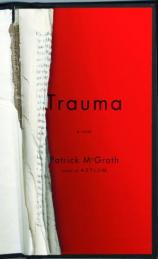Trauma
Review
Trauma
Patrick McGrath’s talents at mining the human psyche are
exquisite. In each of his works he has the ability to deftly peel
back the mysterious layers of his characters, exposing them to the
reader in much the same way he would peel an onion. Their fears,
their flaws, their hopes, their dysfunctions are all brought to
light and laid bare in a way that many authors cannot do with
similar success. With TRAUMA, McGrath's newest psychological
thriller, those honed skills continue to work wonders.
TRAUMA is told through Charlie Weir. He is a successful
psychologist and that's about it, doing his best to aid
psychologically afflicted Vietnam War veterans in late-1970s New
York City. His marriage has failed, he's a weekend father, he
visits prostitutes to sate his needs, he loathes his artist
brother, Walt, he outright hates his vagabond father and he dotes
on a mother who only has love for his sibling. Charlie is a lonely
man in a city of millions, crushed by his inability to save his
wife's brother. Everything about his life is on a downward slide,
and he reaches rock bottom when his mother dies.
That event sparks a new path for Charlie. His former wife, Agnes,
comes back into his life, embracing him at the expense of her
current marriage. At the same time, however, a new woman catches
Charlie's fancy. She has an explosive anger and horrific nightmares
that Charlie believes are flashes of buried childhood trauma --- a
trauma that threatens to destroy their tenuous relationship before
it really starts.
Even then, as Charlie tries to fix others, the very fabric of his
own deeply buried secret begins to unfold, and a family trauma from
his childhood long passed off as a dream becomes a hauntingly real
revelation that could undo him completely.
Throughout TRAUMA there is the unnerving feeling of resting
precariously on an abyss over which Charlie, or even his daily
companions, can slip and plummet at any moment. McGrath does such a
phenomenal job at keeping heightened tension without doing so
overtly. It is almost a natural element of his writing, and the
near panic is woven into each passage.
Amazingly, while each person is supremely flawed and has those
flaws openly exposed, they all are people who draw interest and
concern from the reader. Even as they may do things considered
unacceptable, they often redeem themselves throughout the natural
course of their lives. Each of these characters seems a real,
living entity that any of us could encounter on any given day. It
is this definition and completeness of character that makes TRAUMA
work.
If there was one place where the book didn't pay off, it would be
with its ending. The patience in telling the story up until the
last two chapters was cast aside, making the reveal and resolution
a frenetic and hurried moment crammed onto a handful of pages. Even
with this failing, however, TRAUMA is still a wondrously strong
title from a gifted writer who should be getting far more
attention.
Reviewed by Stephen Hubbard on January 23, 2011





